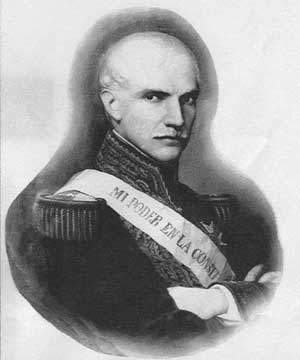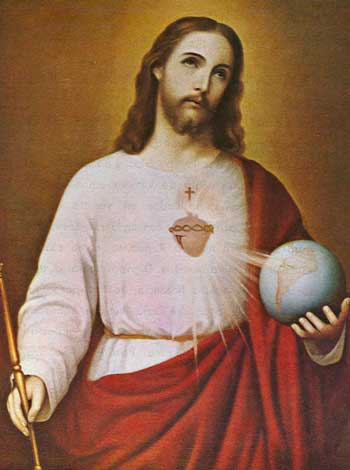Men are great when they fight for justice and the common good. Unfortunately, today's statesmen — ministers, congressmen, members of parliaments — work for evil, and cause the misfortune of nations. Laws in favor of divorce, abortion, same-sex marriages, godless schools, destroy peoples, and bring them to the level of beasts. This is all the more incredible since most of the statesmen of our Western nations are baptized Christians, who have therefore renounced their Faith, and agreed to destroy the Christian civilization.
Our Pilgrims of St. Michael who are touring Ecuador are delighted to see there a population of practicing Catholics, even the vast majority of the youth, filling the churches for each of the 6 to 8 Masses every Sunday. This is the legacy left by a great Christian head of State, Gabriel Garcia Moreno. (The following text is taken from an essay by Gary Potter, based on a biography written by a French Redemptorist, Father A. Berthe.)
 Gabriel Garcia Moreno Gabriel Garcia Moreno |
On the Feast of the Transfiguration, August 6, 1875, a statesman, whom many would call the greatest the world has known since the so-called Reformation, was cut down by Masonic assassins on the porch of the cathedral in his nation's capital. Moments before, until lured outside by a false message that he was urgently needed elsewhere, he had been adoring the Blessed Sacrament.
Fallen from the porch and lying stretched out on the ground, his head bleeding, his left arm severed and right hand cut off by blows of a machete, the illustrious victim recognized his assailants — recognized in the sense of understanding for whom they acted. Some accounts say he gasped his last words, others that he was able to cry them out defiantly. All agree on the words themselves: “Dios no muere!” “God does not die!”
Striking as these words were as a summing up of the moment — they amounted to saying, “You may murder me, but you can never kill the One whom men like you really want dead” — other words voiced by the felled leader on other occasions can be compared to them for aptness. These would include, above all, the words of his political creed, one for whose realization he spent himself in life and would finally die, words that were and are a summing up of the whole of Christian doctrine when applied to the sphere of politics, the means by which the life of a society is governed: “Liberty for everyone and everything, except for evil and evildoers.”
Insofar as the man was guided by that creed in his governance of the nation, we can understand how it was that what he wrought would become, as Pope Leo XIII described it: “The model of a Christian state.” The nation was Ecuador. The man was Gabriel Garcia Moreno, twice President of the Republic, and throughout most of his adult life the nation's most commanding figure as a lawyer, legislator, scholar and soldier, as well as a statesman.
Gabriel Garcia Moreno was born on December 24, 1821, in Guayaquil, Ecuador, the youngest of eight children. His father, Don Gabriel Garcia Gomez, was born in Spain and became a successful merchant after emigrating to Ecuador. It was there that he married Dona Mercedes Moreno.
Gabriel obtained a degree in law from the University of Quito, opened a legal practice, and began to become politically active. In 1850, he had travelled throughout France, England and Germany. Upon his return to America, he came across the Jesuits, and realized they were not as bad as one depicted them in his native country. He brought them to Ecuador, and obtained from the President the authorization for them to settle in Ecuador.
However, not long after, General Urbina brought a revolution, and banned the Jesuits. Garcia Moreno founded a newspaper to protest, but was arrested by Urbina, and sent in exile to Paris, France, without any trial. It was there that Garcia Moreno rediscovered and strengthened his Faith.
After the fall of Urbina in 1856, Garcia Moreno returned to Ecuador, where he was first appointed judge, then senator, and finally president in 1861. Before his presidency, Ecuador's state of affairs was dreadful: disorder prevailed at every level of administration, the army was spreading terror among honest citizens, there was practically no education, moral standards were cruel and corrupt, and the State Treasury had to borrow at rates of 20 percent.
Under Garcia Moreno's presidency, everything changed. He lifted the ban on foreign religious, and basically turned over the running of the nation's schools, from the primary ones to the polytechnical training college in Quito, to the religious orders, especially the Jesuits. No nation in Latin America at that time made greater strides in education than Ecuador.
 Historic picture of the Consecration of 1874 Historic picture of the Consecration of 1874 |
Under Garcia Moreno, Ecuador, by an act of its Congress, was dedicated as a nation to the Sacred Heart of Jesus, on March 25, 1874. (130 years later, on March 25, 2004, the Bishops of Ecuador officially renewed this consecration to the Sacred Heart of Jesus.) When the Papal States were overrun by the troops of Victor Emmanuel in 1870, and the Pope became a virtual prisoner in the Vatican, the government of Garcia Moreno was the only one in the entire world to protest. That was not all. Victor Emmanuel's conquest of the Papal States having deprived the Holy See of the main source of its revenues, Garcia Moreno had the Ecuadorian Congress vote a tithe of ten percent of national monies for the financial support of Blessed Pope Pius IX.
His presidency improved the lives of Ecuadorians of every class and ethnic group. Besides the schools he built, there were hospitals and roads. A railroad over the mountains between Quito and Guayaquil was begun so that the two main sections of the country, the Costa and the Sierra, would be brought together. Garcia Moreno also saw to the planting of countless eucalyptus trees from Australia to stop the soil erosion that began when poor Indians cut down ground cover for fuel.
Garcia Moreno attended Mass every day, recited the Rosary every day, and spent a half-hour every day in meditation. Was he sincere in all of this, or was all of it a pose? To the accusation of hypocrisy, he replied: “Hypocrisy consists in acting differently from what one believes. Real hypocrites, therefore, are men who have the Faith, but who, from respect, do not dare to show it in their practice.”
Garcia Moreno was really sincere in practicing his Faith publicly, as it is demonstrated by the rule for his daily life that he wrote on the back page of the copy of The Imitation of Christ by Thomas a Kempis that was found in his pocket after his assassination:
“Every morning when saying my prayers I will ask especially for the virtue of humility. Every day I will hear Mass, say the Rosary, and read, besides a chapter of the Imitation, this rule and the annexed instructions. I will take care to keep myself as much as possible in the presence of God, especially in conversation, so as not to speak useless words. I will constantly offer my heart to God, and principally before beginning any action... To make every effort, by the thought of Jesus and Mary, to restrain my impatience and contradict my natural inclinations. To be patient and amiable, even with people who bore me; never to speak evil of my enemies. I will make a particular examination twice a day on my exercise of different virtues, and a general examination every evening. I will go to confession every week. I will avoid all familiarities, even the most innocent, as prudence requires. I will never pass more than an hour in any amusement, and in general, never before eight o'clock in the evening.”
The medical examination of Garcia Moreno after he was killed, on August 6, 1875, showed that he was shot six times and struck by a machete fourteen times. One of the machete blows sliced into his brain. Incredibly, he did not die immediately. When cathedral priests reached him, he was still breathing. He was carried back inside and laid at the foot of a statue of Our Lady of Seven Sorrows. A doctor was called, but could do nothing. One of the priests urged him to forgive his killers. He could not speak, but his eyes answered that he had already done so. Extreme Unction was administered. Fifteen minutes later, he was dead, there in the cathedral.
Here is what Blessed Pope Pius IX, speaking of himself in the third person, had to say in a public address in Rome on September 20, 1875:
“In the midst of all this, the Republic of Ecuador was miraculously distinguished by the spirit of justice and the unshakeable Faith of its President, who showed himself ever the submissive son of the Church, full of devotion for the Holy See, and of zeal to maintain religion and piety throughout his nation. And now the impious, in their blind fury, look, as an insult upon their pretended modern civilization, upon the existence of a Government, which, while consecrating itself to the material well-being of the people, strives at the same time to assure its moral and spiritual progress. Then, in the councils of darkness organized by the sects, these villains decreed the murder of the illustrious President. He fell under the steel of an assassin, as a victim to his Faith and Christian charity... For Pius IX, also, the death of Garcia Moreno is the death of a martyr.”